Billion-dollar money laundering case: What will happen to cars, bags and watches seized by police?
Sign up now: Get ST's newsletters delivered to your inbox
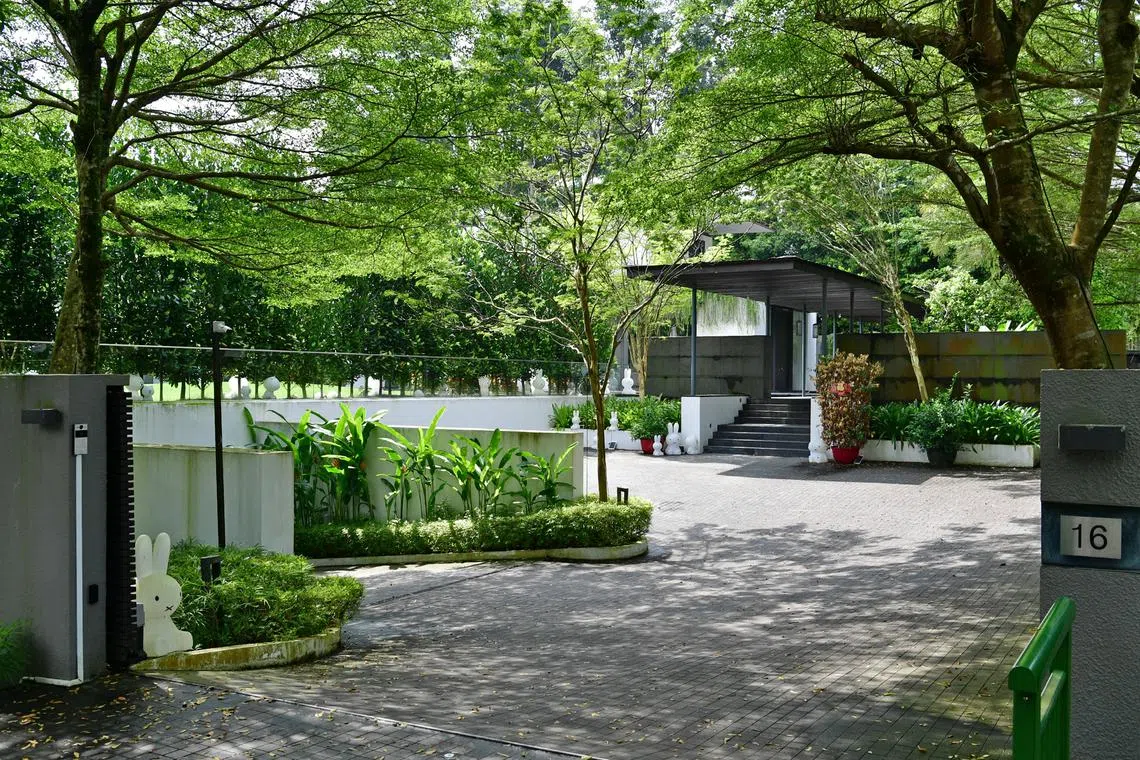
The assets that have been seized, frozen or blocked can be held until the conclusion of the case.
PHOTO: ST FILE
SINGAPORE - An islandwide blitz by the Singapore Police Force on Aug 15 led to the arrest of 10 foreigners, including five who were subsequently charged under an anti-money laundering law.
The Corruption, Drug Trafficking and Other Serious Crimes (Confiscation of Benefits) Act, or CDSA, allows the authorities to immediately seize or freeze assets.
In the current case, the police took control of around $1 billion worth of assets in Singapore,
The items include Patek Philippe watches, Hermes bags
The Straits Times spoke to lawyers and luxury goods dealers to understand the legal procedures and care needed for the confiscated items, which also include expensive bottles of wine.
Q: What is the CDSA?
A: The law, which came into effect in November 1992, allows the authorities to immediately seize or freeze assets, or block any further transactions. The first time it was enforced was in 1994, when more than $1 million in cash and valuables belonging to drug suspects were seized by the courts.
Lawyer Cory Wong, director at Invictus Law Corporation, said the law can be enforced as long as some link is established to show criminal activity. “There is no need to even wait until the person is formally convicted by the court, which could take months or even years for the legal proceedings to conclude,” he added.
It is also possible to confiscate assets acquired by a third party or close relative.
The law was amended in May 2023
Q: What happens to assets that are seized, frozen and blocked from being sold?
A: Once the law is enforced, the state can immediately take control of the assets – including properties – that belong to the accused person.
Said Mr Wong: “The assets might well just sit in storage and collect dust; at the same time, the law recognises that an accused person might well be acquitted at the end of the day.”
Under the Criminal Procedure Code, the police will take custody of physical items such as electronic devices, cash or personal belongings, said lawyer Eugene Thuraisingam in a paper published online.
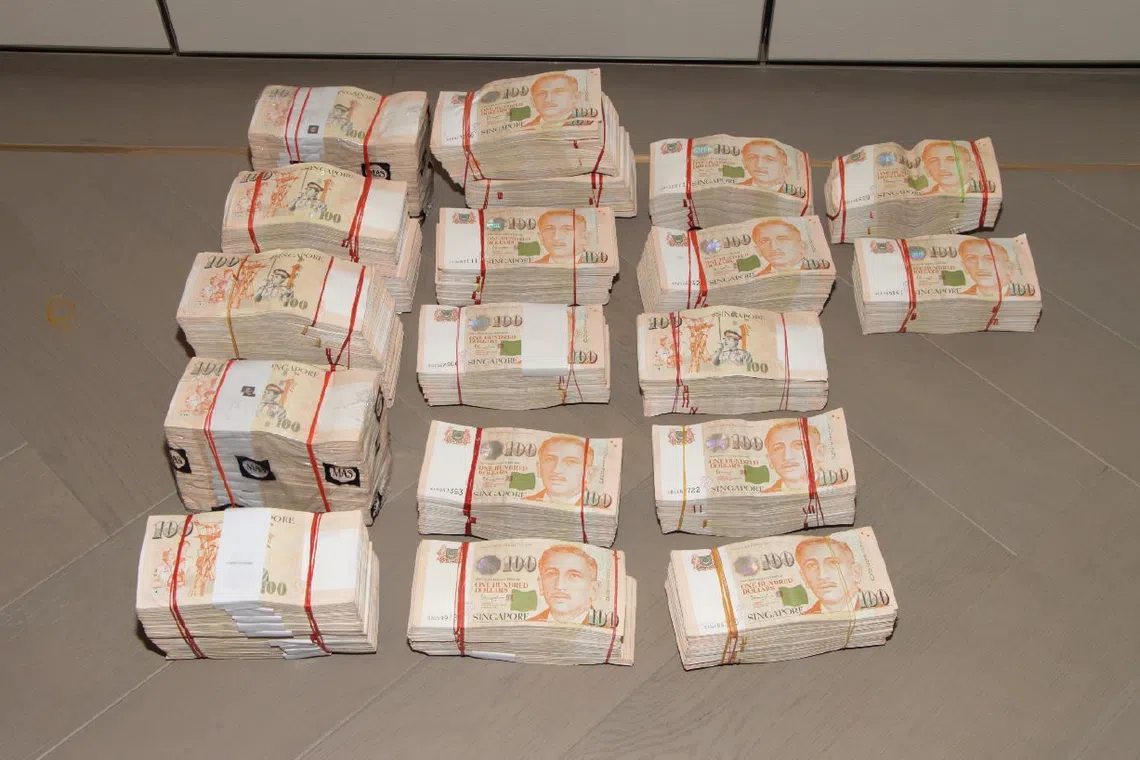
Under the Criminal Procedure Code, the police will take custody of physical things such as electronic devices, cash or personal belongings, said lawyer Eugene Thuraisingam.
PHOTO: SINGAPORE POLICE FORCE
As for money in bank accounts or shares, the police will usually issue an order that prevents the financial institution or account holder from dealing with the money.
An order will be issued for any property as well, to prevent the holder from dealing with it.
Mr Wong said there are legal safeguards in place to prevent the authorities from selling off the frozen assets while the case is ongoing.
Q: How long can confiscated assets be held by the police?
A: The assets can be held until the conclusion of the case. Said Mr Wong: “Simply put, the assets can be frozen by the authorities for as long as the case requires, or in other words, for as long as it takes for the conviction or acquittal.”
Q: How should luxury handbags, watches and wine be stored?
A: The items seized in the billion-dollar money laundering case include designer handbags by fashion houses such as Hermes, Chanel, Dior, Louis Vuitton and Prada. Some of the bags cost upwards of $100,000 in the market.
Ms Florence Long, founder of LuxLexicon, a luxury handbag reselling business, said the goods have to be handled with care to maintain their value.
“They are to be stored in a temperature-regulated room with special care to avoid harsh lighting, dust and humidity.”
She said the bags, which are predominantly made of leather, have to be handled with gloves to avoid any contact with perspiration.
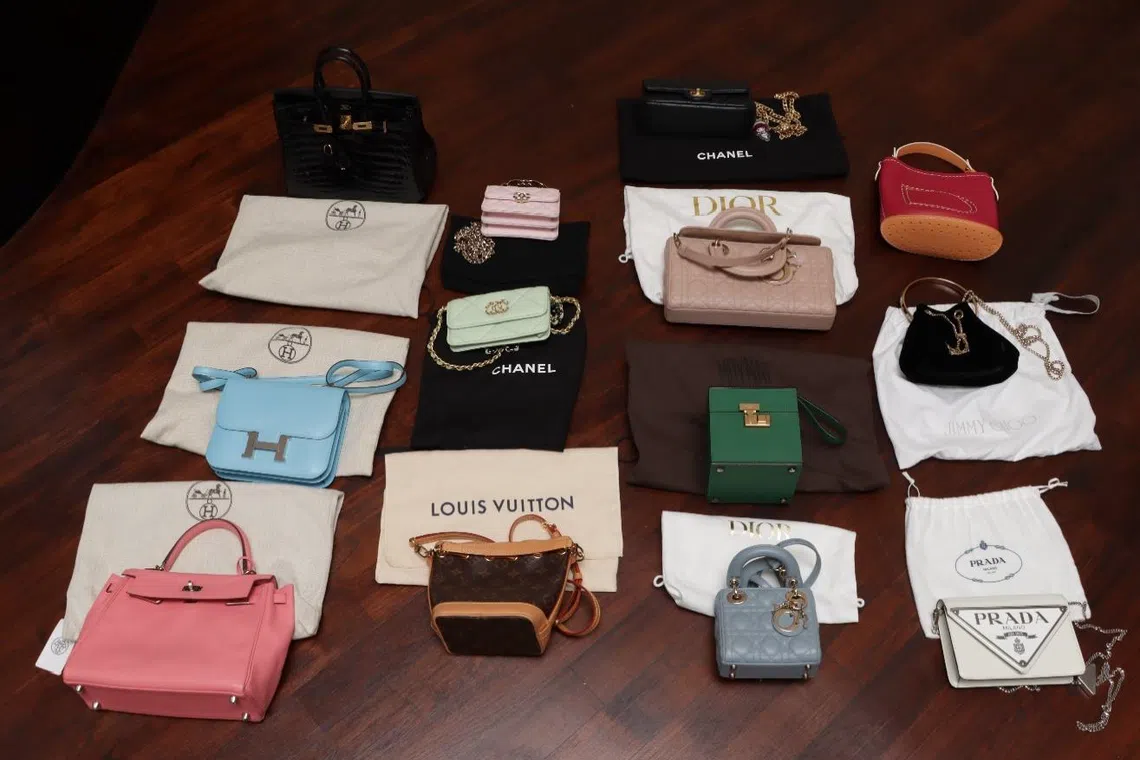
Items seized in the billion-dollar money laundering case include luxury handbags by fashion houses such as Hermes, Chanel, Dior, Louis Vuitton and Prada.
PHOTO: SINGAPORE POLICE FORCE
Mr William Tan, manager of luxury watch dealer Watch Exchange, said the watches must be kept dry under room temperature.
“They should be kept away from sunlight, moisture and dust. The watches should be laid flat and with the dial facing up.
“They should also be wound at least once a month.”
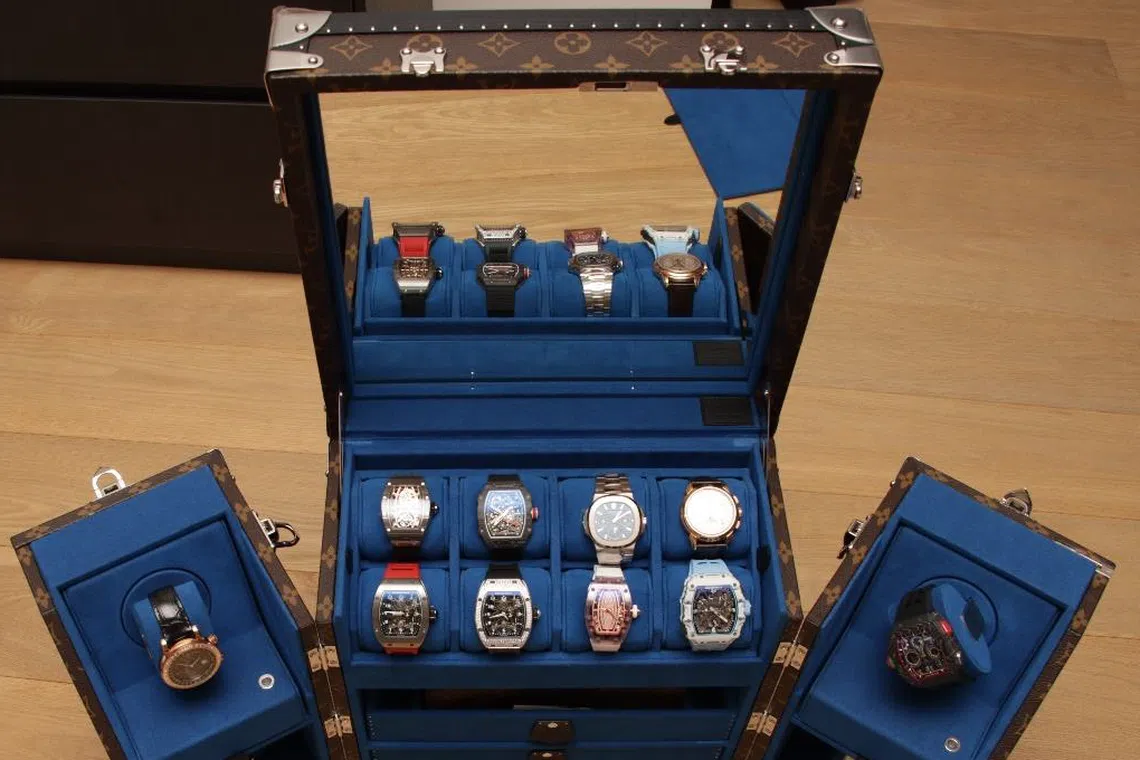
The police took control of more than 250 watches and luxury bags.
PHOTO: SINGAPORE POLICE FORCE
He added that the certificates that come with the watches should be stored properly as well.
“Without the certificate, the value of a watch will drop by 20 per cent to 30 per cent,” said Mr Tan.
Mr Richard Lee, director of Estate Wines, said the bottles of wine confiscated should be stored in a place where the temperature is between 18 deg C and 20 deg C.
He added that not all wines can be aged for prolonged periods.
“No other special treatment is needed. Besides temperature, the bottles should be well managed with no vibration and little direct lighting. They should also be well insulated to avoid moisture from gathering.”
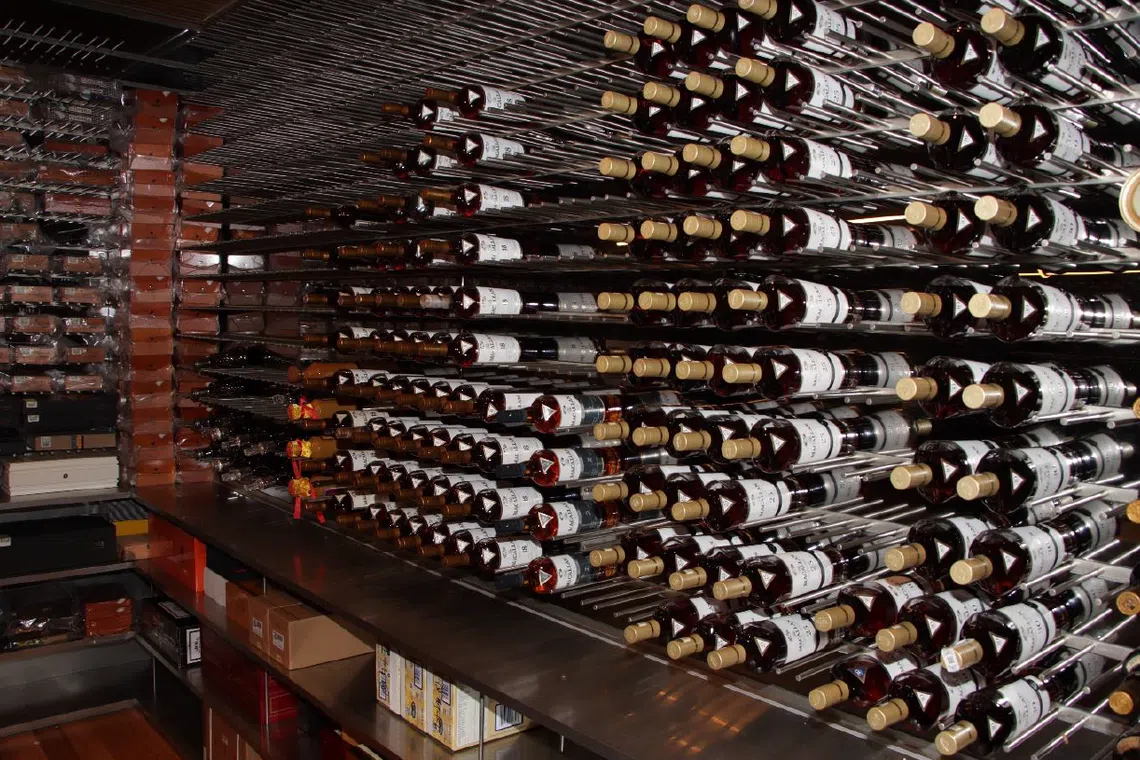
Not all wines can be aged for prolonged periods, said Mr Richard Lee, director of Estate Wines.
PHOTO: SINGAPORE POLICE FORCE
Q: How are confiscated assets disposed of?
A: In court, the prosecutor has to prove that the accused person held assets that are disproportionate to his known sources of income.
When this is proven, the law provides for the assets to be confiscated at the conclusion of the case.
“If linked to serious crimes like money laundering, the state will have the power to confiscate the money or assets, upon conviction of the accused person,” said Mr S.S. Dhillon, senior partner at law firm Dhillon and Panoo.
The court will then hold a disposal inquiry. But there is no telling what will happen to the luxury cars, bags or watches after they are confiscated.
“There are currently no provisions under the law that dictate what the state will do with the seized assets,” Mr Dhillon said.
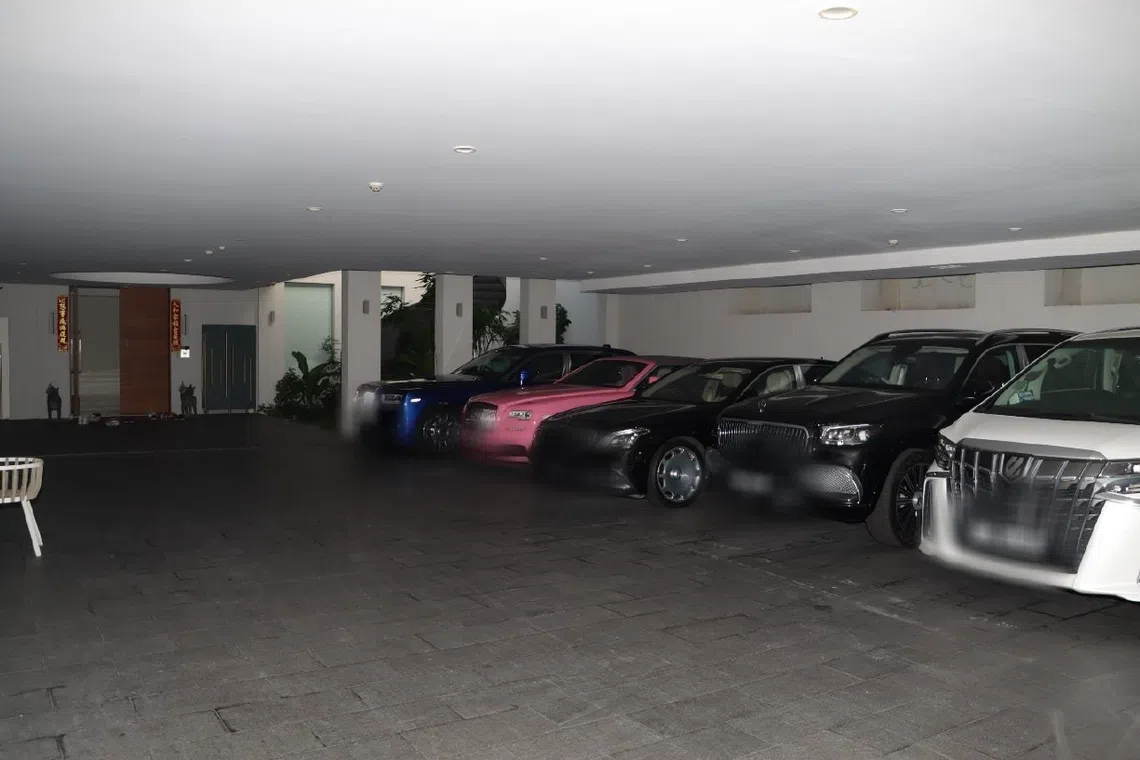
The luxury cars seized by the police.
PHOTO: SINGAPORE POLICE FORCE
Mr Wong said a sheriff’s sale could be performed if the court orders the assets to be sold by public auction. “This is done to liquidate the non-cash assets into cash so that whatever proceeds from the auction can be used to satisfy the monetary claims ordered against the respondent.”



